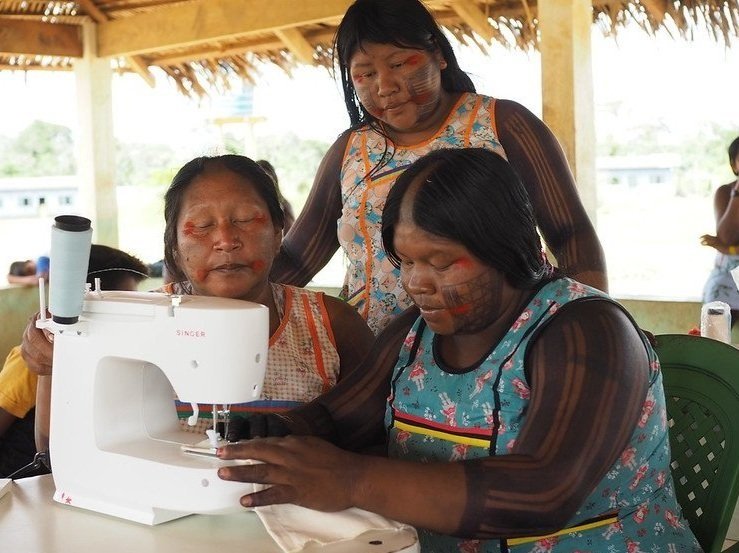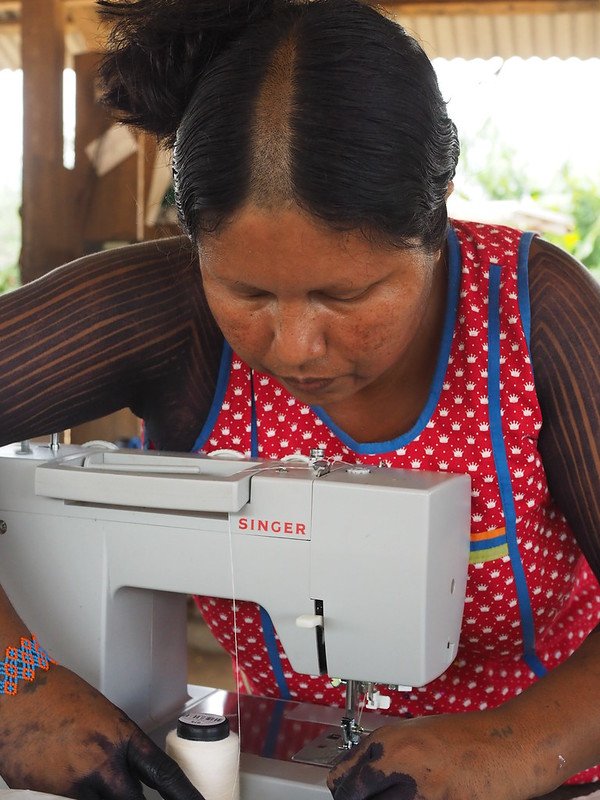Located in the Pará state of Brazil, Associação Bebô Xirin do Bacajá (ABEX) is an Indigenous-led association that participated in the Amazon Indigenous Rights and Resources (AIRR) project launched in 2021 to support Indigenous populations to become more visible and active actors in the Amazon economy, in ways that conserve rainforest biodiversity and build environmental resiliency. Upon the project’s conclusion, ABEX joined the NESsT Amazonia portfolio.
The AIRR project was co-implemented by NESsT in partnership with World Wildlife Fund (WWF), Indigenous organizations, and the Coordinator of the Indigenous Organizations of the Amazon Basin (COICA), with support from the United States Agency for International Development (USAID).
The Associação Bebô Xirin do Bacajá (ABEX) was founded in 2003 with the mission of safeguarding the Xikrin people within the Trincheira Bacajá Indigenous Land (Pará, Brazil). Its goal is to improve their quality of life and social well-being by promoting social and biodiverse products from the forest, beginning with Amazon nuts.
Culturally, Xikrin women had limited visibility within their territory, and were often relegated to roles as mothers and stewards of their homes and traditions. Xikrin women (known as "menires" in the Mebêngôkre language) were initially excluded from ABEX’s decision-making processes and the commercial aspects of production. Since Amazon nuts were ABEX’s sole product, it was men who managed negotiations and sales, leaving little economic benefit for women, whose primary responsibility was to process nuts by breaking, washing, and drying them.
However, this situation began to change in 2020 during the COVID-19 pandemic, when ABEX received a small grant to produce protective masks featuring traditional Xikrin artwork. This project sparked many women’s interests, offering them a new perspective on life through handicrafts. The number of women engaged in handicrafts quickly surged, expanding to 12 more ABEX-associated communities, totaling 117 members. They diversified their products to include items such as bags, fabrics, and beads.
With support from the Amazon Indigenous Rights and Resources (AIRR) project – implemented in Brazil by the Coordination of Indigenous Organizations of the Brazilian Amazon (COIAB), Federation of Indigenous Organizations and Peoples of Mato Grosso (FEPOIMT), Federation of Indigenous Peoples of the State of Pará (FEPIPA), NESsT, and WWF, with the support of the United States Agency for International Development (USAID) – the women of the Trincheira Bacajá transitioned from manual to mechanized production thanks to donated sewing machines and training in cutting and sewing. This enabled Xikrin women to make more intricate products such as cases, notebooks, and dresses.
These efforts to strengthen the handicraft business line was tailored to fulfill the aspirations of Xikrin women, as they viewed handicrafts as a means to generate income and exercise greater autonomy over their decisions, with reduced mediation by men. Nowadays, Xikrin women not only manage their households and harvest Amazon nuts, but they also work outside their communities to promote and sell their products.
The artisanal supply chain experienced remarkable growth in terms of membership and sales, so much so that in 2021, revenue from handicrafts almost equalled that of Amazon nut production.
Despite this, women still had no role in decision making. During a visit from AIRR’s technical team in April 2022, the president of the artisan group was convinced that it would be only fair to have at least one female representative on the ABEX board. This representative would be able to advocate for the handicraft and babassu oil (a new product ABEX was promoting) supply chains.
Even though initially the association’s president expressed doubts that men would vote to support women’s participation on the board, he agreed to establish an advisory committee composed of Xikrin women. In March 2023, a new assembly convened to elect the board of directors, which resulted in the creation of both a menire committee and the election of a women deputy treasurer to the board, along with an additional representative for the association’s supervisory board.
ABEX is now part of the NESsT Amazonia portfolio, which will support ABEX with investments, mentoring, training, and social impact monitoring for the next three years. These efforts will continue to promote gender equity and the empowerment of Xikrin women of the Trincheira Bacajá, building on the progress achieved through the AIRR project.





